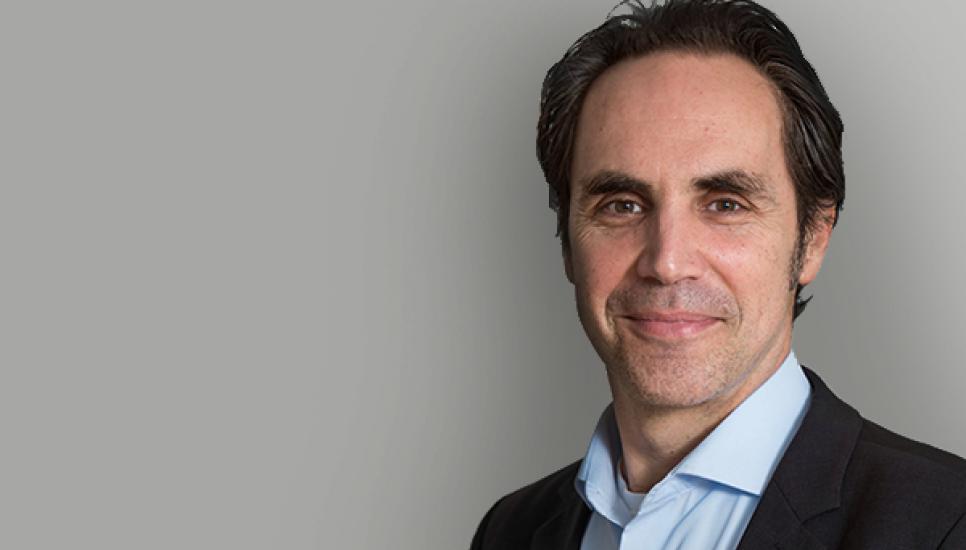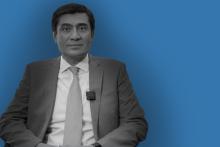Stefan Schurig: Change is not just an elite thing

Having started his career on construction sites and training as an architect, Stefan Schurig’s early pivot into highlighting climate change and energy issues by transforming cities into self-sufficient systems has shaped him into an authoritative voice on sustainability issues.
A former climate energy director for the World Future Council, long-time head of the Greenpeace Climate and Energy department and co-founder of Germany’s nationwide green electricity supplier Greenpeace Energy, Schurig was also a member of the REALISE Forum – an international platform on renewable energy policies led by the European Commission – among many other environmentally focussed roles.
He's now secretary general of the Foundations Platform F20 (an international network of philanthropic organisations) and managing director of The Toni Piëch Foundation, a fund working towards a sustainable and regenerative future for all, created by the Swiss founder of electric car manufacturer Piëch Automotive.
Ahead of talking on behalf of The Toni Piëch Foundation, at the ClimateTech Investing Forum 2022 – a cutting-edge event linking innovative companies with family offices and family foundations held in Lausanne, Switzerland, on December 6 and 7 – Schurig talks about the foundation’s aims, the importance of the UN’s Sustainable Development Goals and how next gens are driving positive change.
Cement production accounts for 6% of global emissions – almost double the entire aviation sector.
What are the aims of The Toni Piëch Foundation?
The idea was that we would identify areas where we have a network and where we have knowledge and intelligence and where the founder feels committed to. We then identified sub areas that need seed funding for further development and then hopefully unfolding a much larger impact.
The key areas we’re focussing on start with regenerative construction, that's a major issue and possibly the most neglected one when you look at carbon emissions. Everyone speaks about the carbon footprint of flying (which is indeed quite high when looking at the per capita emissions), driving in a car or burning coal for electricity generation. However, cement production accounts for around 6% of global emissions – that’s almost double the amount of the entire aviation sector. When you factor in the carbon footprint of concrete, which also uses steel, the whole sector of construction becomes one of the biggest emitters and, therefore, needs to be further developed and decarbonized.
The cement industry is aware of it and is acknowledging the problem and trying to find solutions, but they are probably 20 years behind where they should be. So we're looking into technologies and research and campaigning where small grants between €50,000 and €100,000 or so can make a big difference.
One of the other areas the foundation is focused on is renewable energy at the local level. We’re asking how we can empower cities to be aware of their renewable energy potential and how to how to better roadmap, plan it and harvest it. So we're working with universities to gather mature software tools to better road map the local energy transition.
The third sector of focus for the foundation is communication and storytelling. We need to know the story behind things. Toni Piëch is a journalist by training, I first met him when he ran a media company in China, and he firmly believes that communication and storytelling supports the message we’re sharing.

As secretary general of the international Foundations Platform F20 – a network of more than 70 foundations advocating for the alignment of the G20 with the Paris Climate Agreement and the Sustainable Development Goals of the UN – are you seeing an uptick on businesses adopting SDGs?
I've always seen the SDGs as the world's most relevant reference for sustainable development. The fact that pretty much every government has agreed to them and that 2030 is a concrete goal, I think is testament to what a hugely important reference the SDGs are.
One of my most remote SDG encounters I’ve had was when I went to a renewable energy workshop which we organised in Sierra Leone. I was on a tuk-tuk going through the informal settlement of Freetown and I saw SDG graffiti on the wall. It really showed me that the goals are not just an elite thing, people all around the world can and do connect with them and use them as an important reference.
As a seismograph for where we are at and where we should be, the goals are really important.
We now need to change this linear approach to a circular system.
Campden Wealth’s 2022 North America Family Office Report found there is an increased interest in sustainable investing. Nearly half of family offices globally now invest sustainably and this figure has grown rapidly year on year. The number-one theme these investors are targeting is climate change mitigation, with 77% investing here. In your opinion is the message about the effects of climate change finally getting through?
I would say the majority of investors I’ve met do as much as they can with the knowledge they have. For that reason, I think it’s really important to have some kind of measurability of sustainability impact and investments into sustainable development. For example, If you had mandatory disclosure of carbon emissions to financial products, which is one of the recommendations made by the G20, this would help enormously.
The more sustainable impact these investments have, the better their revenues will be. And I think we're reaching that point step by step because of binding national legislation, international registries, corporate accountability, disclosure regulations etc, that you see emerging now in different countries.
Generally speaking, I think that our current economy, the operating system that we have is a linear system, we're basically growth focused, a resource-absorbing economy. We now need to change this linear approach to a circular system focussing on nature and environment, our very basic living condition.

The same report found that, increasingly, sustainable investing is considered to be of great importance, with more than a third of North American family offices now engaging in sustainable investing, with a particular focus on climate change mitigation. This trend is thought to have been driven by next gens. Is this generation the one to make the changes that are so urgently needed?
It definitely is the generation that can make change happen. It is a very good sign that the next generation has understood that change is needed, but will they do it? Well, I really think they will. But this won’t replace the need to adapt legislation and discussing whether investments are actually paying off the debt or still furthering the disruption.
The next gen alone cannot just shift these investments without necessary legislation or response. But I think that the next gen knows well what’s at stake. As far as my experience goes, many of them are less attached to how we did things in the past and more attached to how we have to do things in the future.
Stefan Schurig will speak at Campden Wealth’s ClimateTech Investing Forum 2022 in Lausanne, Switzerland, on December 6 and 7.
For more information and to book a place, visit www.climatetechinvesting.com.
To participate, email Anton Paul via antonpaul@campdenwealth.com.






